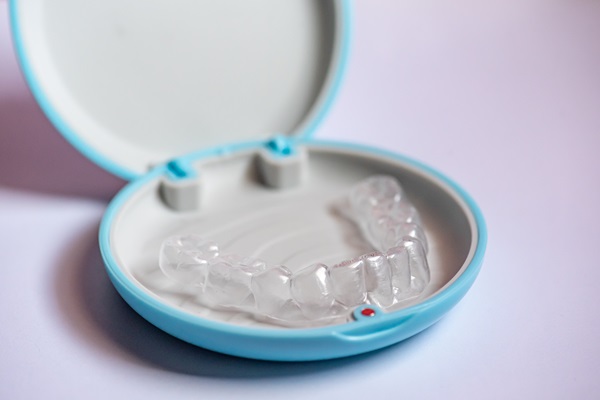5 FAQs About Clear Aligners

Clear aligners are a great orthodontic option that many general dentists are now offering. They are popular due to their flexibility, convenience, and ease; however, because they are still considered relatively new to dentistry, there are still a lot of questions regarding how they work and what the treatment process entails. Read on to learn more about clear aligners.
5 Frequently asked questions about clear aligners
Outlined below are a few frequently asked questions and answers regarding clear aligners. It can be helpful to review the following information when considering teeth straightening from a general dentist.
1. How long does clear aligner treatment last?
Clear aligners are different for each patient; however, for the most part, the treatment process does not last longer than a year. Patients that have mild to moderate orthodontic issues are much more likely to respond better to clear aligners, as they do not require lengthy treatment as is typically the case with braces.
2. Do clear aligners hurt?
Most patients report little to no discomfort with clear aligners. Of course, there will be some slight soreness when treatment first begins; however, unlike braces, clear aligners are easier on the mouth, which results in less soreness and pain. Any soreness can be remedied with over-the-counter medications, and it is not likely to persist for more than three days.
3. How often do clear aligners have to be changed?
Like other teeth-straightening methods, clear aligners are adjusted every six to eight weeks. Patients will visit the general dentist for an examination and check-in. The dentist will check on their progress and provide the patient with the next set of aligners, which will all have been custom-created in a dental lab before the process has started. Recent dental technology allows for the custom-creation of an entire series of clear aligners, which are based on the patient's goals.
4. Are clear aligners removable?
Yes. Clear aligners are removable trays, which makes them convenient to use and much easier on the soft tissues of the mouth. However, because they are removable, it is important to understand that there is a certain level of discipline required when undergoing treatment. Clear aligners have to be worn for at least 22 hours a day to ensure effective results.
5. Is there any special care while wearing clear aligners?
No. Patients wearing clear aligners are encouraged to practice good oral hygiene every day, including brushing, flossing, and rinsing. Brushing should be done twice a day or after every meal, and flossing should be done once a day. Because clear aligners are removable, they do not require any special care other than rinsing.
Getting started with clear aligners
When looking for more information on clear aligners, it is best to consult directly with a general dentist. An evaluation can be done, and any questions or concerns can be properly addressed, all of which will be used to determine the most suitable course of action. Contact us today to find out more or to get started with an appointment.
Request an appointment here: https://knoxvilledentalpartners.com or call Dental Partners South Knoxville at (865) 622-2381 for an appointment in our Knoxville office.
Check out what others are saying about our dental services on Yelp: Clear Aligners in Knoxville, TN.
Related Posts
Clear aligners are a discreet teeth straightening treatment option that involves custom-fit transparent trays that pull teeth into an ideal position. It is a great way to improve the attractiveness of your smile and fix issues such as crooked teeth, overcrowding, gaps between teeth, protruding teeth and bite complications. Patients who know more about the treatment…
Understanding how clear aligners work is the first thing someone needs to do when considering these popular teeth straightening options. Because there are a few different straightening options to choose from due to updated dental technologies, those needing straightening services have a few choices. Clear aligners are one of the popular options people are choosing. Understanding what clear aligners are…
A dental bridge replaces one or more missing teeth by anchoring a lifelike “pontic” to neighboring teeth or implants. This fixed option restores chewing, speech clarity, and a natural-looking smile line. By filling the space, a dental bridge helps prevent drifting teeth, changes in bite, and excessive wear on remaining enamel. The material, whether porcelain…
When a sports-related collision or fall occurs, an emergency dentist helps protect teeth, gums, and the jawbone from lasting harm. Dental trauma often looks minor at first, yet hidden cracks or nerve injuries may develop quickly. Acting fast supports comfort now and better outcomes later. Knowing what first steps to take can make all the…
